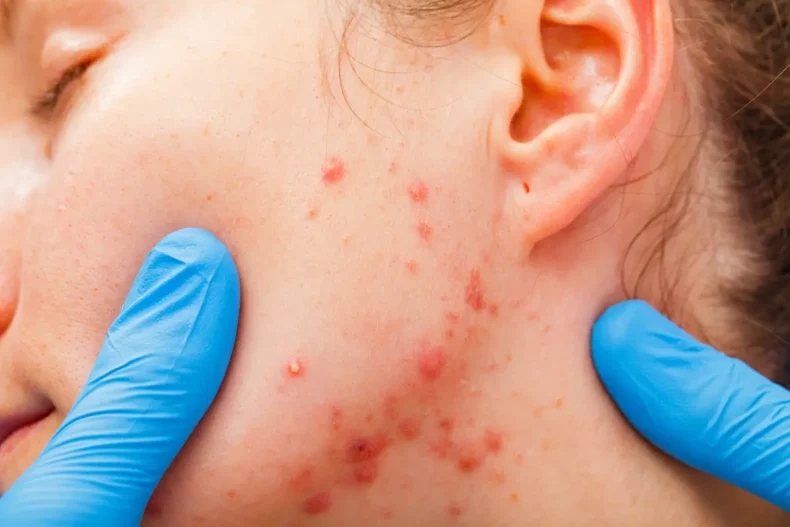Acne is one of the most common yet problematic conditions people around the world suffer from. Hormonal acne is when breakouts form in adulthood that could range from blackheads and whiteheads to painful cysts. Hormonal acne is linked to the overproduction of sebum (an oily substance in skin glands), which clogs pores, leading to pimples. Though often unavoidable, hormonal acne can be treated to prevent future breakouts from forming. Acne causes bumps on your face, shoulders, chest and back in the following forms:
- Pimples.
- Blackheads.
- Whiteheads.
- Cysts.
Hormonal acne affects both men and women, but the majority of cases occur in women, pregnant women and women going through menopause. Acne is the most common skin condition in the U.S. It affects nearly 80% of the population during their lifetime. About 50% of women in their 20s and 25% of women in their 40s get hormonal acne. As the name suggests hormonal acne is caused due to hormones, but we need to explore which hormones actually cause them. The main causes can be explained as:
- Changing hormone levels in women, including around your period, irregular periods, during pregnancy, during menopause or after discontinuing birth control.
- Men undergoing testosterone treatment.
- Family history of acne (genetic predisposition).
- A side effect of a medication (steroids).
- Pre-existing medical conditions (polycystic ovary syndrome, other ovarian conditions and metabolic conditions).
Hormonal Acne is overtly visible and identifiable by us and therefore it is possible to take steps toward its cure. To be better prepared in dealing with such a situation, we must be aware of their specific symptoms. Acne causes lesions (damaged skin tissue) that can become inflamed and be red, painful or sore. Lesions are most likely to appear on your cheeks, but may also appear in the following places:
- Face.
- Neck.
- Back.
- Shoulders.
- Chest.
Hormonal acne can appear as the following types of lesions:
- Whiteheads.
- Blackheads.
- Papules (raised skin tissue, 2-5 mm in diameter).
- Pustules (skin bumps that contain pus, 2-5 mm in diameter).
- Cysts (pockets under the skin that contain fluid).
There are certain factors and products which make this condition worse and we need to be aware of it, to prevent further harm. The following listed factors are primarily responsible for making the condition worse:
- Stress.
- Pollution.
- High humidity.
- Squeezing or picking at blemishes.
- Poor diet (specifically refined carbohydrates and sugars)
It is important to remember that hormonal acne is treatable. Based on the severity of your acne, different treatment options are available to reduce sebum production, pimple formation and painful inflammation:
- Blackheads and whiteheads: Topical cream (tretinoin).
- Inflammatory acne: Topical retinoid and/or topical antibiotic and/or benzoyl peroxide.
- Moderate to severe acne: Antibiotic and/or isotretinoin (retinoid).
- Cystic acne: Steroid injection (intralesional triamcinolone).
- Daily skin cleansing.
- Birth control (oral contraceptives).
- Change in diet.
- Laser or light therapy.
It is recommended to treat acne when it begins to prevent breakouts from continuing, which could lead to permanent scarring and potential self-esteem issues if left untreated.
Though hormonal acne can be unavoidable, there are several things you can do to reduce your risk of getting breakouts:
- Make lifestyle changes to reduce stress, get better sleep and eat a healthy diet.
- Use skin care products that won’t clog pores.
- Discuss treatment options with your healthcare provider for persistent acne.
Acne affects each person differently. It can last as little as a few days to as long as a few weeks. If not treated, acne can persist for months at a time. Treating acne can be different for each individual, but patience is key. Generally, it could take up to four to six weeks to see improvement in your skin after you begin treatment. Even if you don’t notice that the treatment is clearing your skin, it is recommended that you continue treatment to prevent new acne from forming.
It is frustrating to see breakouts on your skin as an adult, considering they are most frequent among adolescents. Talk with your healthcare provider if your acne is persistent and they will be able to offer advanced treatment options to eliminate pesky pimples.
We need to remember that hormonal acne is just a disease or a condition like any other and can be treated and cured as such.













